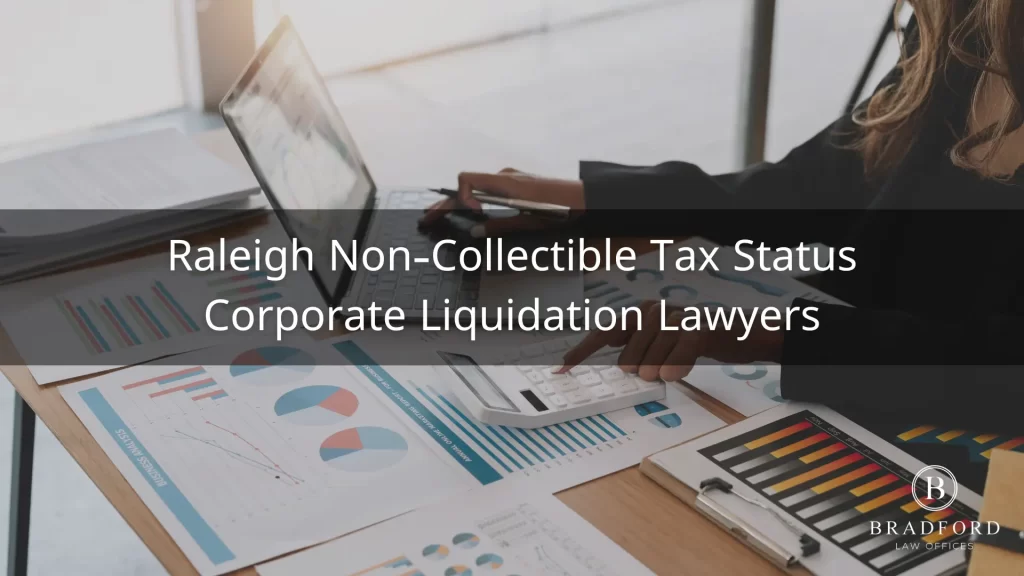
In life, there could be times when you fall behind on tax payments due to sudden life events or changes in your living situation. Corporations and businesses, too, can undergo hardships that prevent them from meeting their financial obligations to shareholders, creditors, and the Internal Revenue Service (IRS).
If you are struggling to make your required tax payments as an individual or a business owner, you might be able to request relief from the IRS by obtaining a non-collectible tax status for your or your business’s tax account. This status does not immediately absolve you of tax debts and fees but instead gives you breathing room to assess your situation and find a financial solution with the government that allows you to make good on your outstanding tax obligations.
At Bradford Law Offices, our team members have helped residents of North Carolina with all types of tax-related legal matters for nearly three decades. Our Raleigh non-collectible tax lawyers have seen it all and know the best ways to prove your eligibility for this tax status relief program with the IRS. Attaining this status can be the final piece of the puzzle that lets you achieve financial freedom by creating a manageable plan to deal with delinquent taxes and debts.
For more information about how our tax attorneys can aid you in the process of applying for non-collectible tax status, contact us by phone at (919) 758-8879 or through our website for an initial consultation session.
What Does a Non-Collectible Tax Status Do?
The IRS has a straightforward goal: to facilitate payments from taxpayers to the government and help taxpayers meet their tax obligations. While it might seem like the IRS is ruthless at times, there are several ways the IRS can help individuals and corporations meet their tax obligations without veering into financial ruin. One of these is by applying a non-collectible tax status to an individual’s or business’ tax account.
Whenever an account has this status, the IRS applies certain protections to it. For example, the IRS will not seize assets or business income in order to pay off debts on a non-collectible tax account. They might, however, keep tax refunds and apply them toward your outstanding debts. Otherwise, these debts will continue accruing interest, leading to more fees.
While your account has a non-collectible tax status, the IRS will send statements to inform you of your tax obligations, but these statements are not bills for required tax payments.
Eligibility for Non-Collectible Tax Status
If the IRS cannot collect taxes from an individual or company due to unforeseen financial hardships, it might apply a non-collectible tax status to the relevant account. Additional reasons for non-collective tax status designations, according to the IRS, include:
- Inability to locate a taxpayer or taxpayer’s business assets
- A taxpayer residing outside of the United States
- Liquidation bankruptcies for corporations, including LLCs
- Death of a taxpayer or sole proprietor with no obvious path toward collection
- Defunct LLCs and corporations
- Corporations or LLCs struggling to stay in business and pay back taxes concurrently
The IRS is more willing to create advantageous tax payment plans with taxpayers who go through the non-collectible tax status application process. Applying and receiving this status tells the IRS that you or your corporation plan, in good faith, to take responsibility for your tax obligations at a later date despite current hardships.
The IRS can attempt to collect back taxes for up to ten years. At any time during this ten-year period, they might require payments from taxpayers and corporations with improved financial situations and increased income compared to the time of application.
What Is Corporate Liquidation?
Corporate liquidation is the process of closing down a company’s operations and distributing its assets to creditors and shareholders, usually when the company is unable to pay its debts or is otherwise financially insolvent. The IRS often designates corporate tax accounts with non-collectible tax statuses when corporate liquidations occur. As federal law allows the IRS to act as a primary creditor in certain situations, the IRS could demand payment before other creditors if a business does not currently have a non-collectible tax status on its account.
 Corporate Liquidation and Non-Collectible Tax Status
Corporate Liquidation and Non-Collectible Tax Status
Starting the process of corporate liquidation or informing the IRS about your intention to liquidate can allow you to obtain non-collectible tax status and give you more financial options when it comes to selling off your assets and securities. Remember, this status prevents the IRS from seizing assets or income to pay outstanding tax bills. That means you have greater control over the time frame and process of corporate liquidation.
Corporate liquidations usually grant this tax status because the IRS understands a corporation that ceases operations and sells off assets is not currently generating income that the corporation or proprietor can put toward a long-term tax payment plan. After liquidation, you will have until next year’s IRS review of your tax account to get your finances in order before you have to worry about a change in your status.
How a Non-Collectible Tax Status Lawyer Can Help
A non-collectible tax status does not immediately forgive your tax debts, so you’ll need to formulate a plan to pay your taxes if you want to avoid unpleasantness with the IRS. A tax attorney can help you stay on top of the situation by:
- Completing required forms, such as the Form 433-B Collection Information Statement
- Itemizing your assets
- Filing past-due returns on your behalf
- Estimating quarterly tax payments
Get Help From a Non-Collectible Tax Status Attorney Today
One year free of tax obligations can be enough to allow you or your corporation to chart a clear path toward financial stability. The attorneys at Bradford Law Offices are eager to begin the process of helping you find relief by obtaining a non-collectible tax status.
Contact us today for a confidential consultation by phone at (919) 758-8879 or through our website to learn how our business bankruptcy attorneys can help you through the complex legal process of seeking non-collectible tax status during your corporate liquidation.
Related Posts:
 Corporate Liquidation and Non-Collectible Tax Status
Corporate Liquidation and Non-Collectible Tax Status